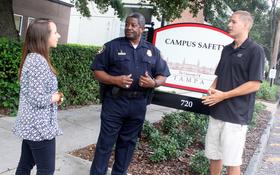In light of increasing concerns over campus safety, some community colleges are banning firearms this fall. The move has renewed debate over whether guns should be allowed on campus, whether carried by students, faculty, or both. While there are arguments to be made in favor of either position, the trend for this year appears to be focused on keeping guns off campus in hopes of keeping students just a little safer during the school year.
California Community Colleges Say No to Guns
The Los Angeles Times reports that all nine campuses in the Los Angeles Community College District in California will become gun-free zones when students head back to class this fall. The Board of Trustees for the schools recently voted unanimously to ban firearms in nearly all circumstances for this school year.
“It is our responsibility to provide a safe environment for our students, allowing them to feel secure and able to totally focus on their academic goals,” Scott Svonkin, vice president of the board, told the L.A. Times. “They must never be fearful about setting foot on one of our campuses,” Svonkin added.
Previous Shootings Spur Decision
The reasoning behind the ban was a string of violent school shootings, with the most recent occurring at Santa Monica College in June, 2013. During that incident, another Los Angeles Times article reported that five victims died, along with the shooter. The 10-minute rampage began when the shooter killed his father and older brother and set their house on fire.
The gunman next hijacked a car at gunpoint and forced the driver to make her way to the Santa Monica College campus. Along the way, he shot randomly at victims, killing two in a car on the way to the school and another outside the college library. A number of additional victims were wounded in that attack, which was brought to an end when police fatally shot the gunman, later identified as 23-year-old John Zawahri.
CBS Local reports that the new firearm ban states “the presence of firearms, even when nonoperational and in the instructional setting, lends itself to the potential for panic and fear. Therefore, the ban requires schools to move instructional classes involving firearms to locations off-campus in the future. Currently, the Administration of Justice and Criminal Justice classes already offer their firearm training at a different location.
However, the ban will require non-credit gun classes to be moved to a different site as well. The classes, which had previously been offered at the Pierce and Harbor campuses, were provided by an organization affiliated with the National Rifle Association, according to LAist. Svokin told LAist the group was also promoting gun ownership in the classes.
Under the new ban, the only firearms now allowed on Los Angeles community college campuses will be those carried by police officers or used during campus theatrical productions.
This video reports on the possible ban of firearms on college campuses.
Not Alone
California is not the only state to issue a firearm ban for college campuses. According to the National Conference of State Legislatures, 22 states currently ban the carrying of concealed weapons on college campuses, including California. Those states include Arkansas, Florida, Georgia, Illinois, Louisiana, Massachusetts, Michigan, Missouri, Nebraska, Nevada, New Jersey, New Mexico, New York, North Carolina, North Dakota, Ohio, Oklahoma, South Carolina, Tennessee, Texas, and Wyoming.
Another 22 states allow the individual college campuses to determine whether they will allow the carrying of concealed weapons on campus. These states include Alabama, Alaska, Arizona, Connecticut, Delaware, Hawaii, Idaho, Indiana, Iowa, Kentucky, Maine, Maryland, Minnesota, Montana, New Hampshire, Pennsylvania, Rhode Island, South Dakota, Vermont, Virginia, Washington, and West Virginia.
Some States Move in Opposite Direction
While firearm bans are often a response to tragedies such as the Santa Monica incident or the Virginia Tech shootings in 2009, other states and schools make the opposite move when they feel the threat of violence. Six states now allow the carrying of concealed weapons on campuses, due to legislation passed in response to a string of school shootings in recent years. Those six states are Colorado, Kansas, Mississippi, Utah, Oregon, and Wisconsin.
Some of those states include restrictions with their firearm allowance. For example, Wisconsin schools are allowed to prohibit the carrying of concealed weapons inside college buildings, as long as a sign is posted at the building entrance. Mississippi only allows individuals to carry a concealed weapon if they have passed a voluntary firearms class taught by a certified instructor.
Colorado and Oregon have both overturned efforts by public colleges in the state to implement their own concealed weapon ban. Utah is unique in that it identifies all colleges as “public entities,” which prohibits the institutions from making rules about firearms that violate the state law.
This video on the firearms on campus controversy.
New Gun Law Causes Confusion for Alabama Colleges
In Alabama, a new gun law allowing the carrying of open firearms in public places has raised confusion about the rules on community college campuses in the state. Al.com reports that the Alabama Community College System will maintain its current prohibition of firearms on campus, despite the new law. The chancellor of the system, Mark Heinrick, has encouraged the presidents at all the schools in the state to post notifications at the entrance of all their campus buildings.
Despite the resolve of the community colleges, some believe the new law will trump campus rules. The general consensus appears to be that the issue will finally have to be put to rest in a courtroom.
As students gear up for a new school year, community college officials are doing their part to keep students as safe as they can. Whether this means prohibiting guns on campus or allowing students to carry their own firearms is debatable from school to school and state to state.
Questions? Contact us on Facebook. @communitycollegereview















